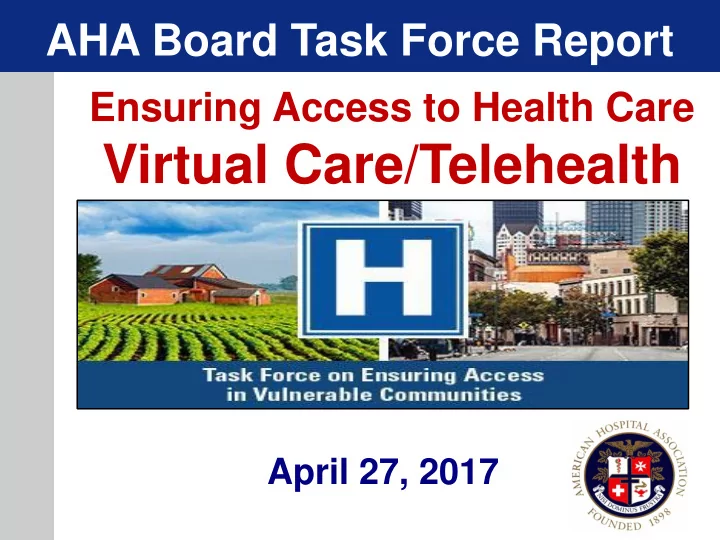

AHA Board Task Force Report Ensuring Access to Health Care Virtual Care/Telehealth April 27, 2017
AHA Board Task Force Report An Executive Leadership Series for Urban & Rural Safety-net Hospitals Priya Bathija, American Hospital Association, Washington, DC Bryan Slaba, Wagner Community Memorial Hospital, South Dakota Janice Favorite, Dignity Health Telemedicine Network, Sacramento
To learn more about the work of this AHA Task Force, please visit www.aha.org/ensuringaccess
AHA Board Task Force Report
AHA Board Task Force Report
Case Examples Bryan Slaba, CEO, Wagner Community Memorial Hospital, Wagner, South Dakota Janice Favorite, Senior Director, Strategy & Business Development Dignity Health Telemedicine Network, Sacramento
American American Hosp Hospital ital Ass Association ociation Ens Ensurin uring g Access Access in Vulnerable in Vulnerable Communities Communities Webin Webinar: ar: April April 27, 2 27, 2017 017 Bryan Bryan Slaba, Slaba, MHA, MHA, FACHE FACHE Chief E Chief Executiv xecutive e Officer Officer Bryan.Slaba@aver Bryan.Slaba@avera. a.org org 60 605-384 384-72 7284 84 Direct Direct
Demographics and Stats Wagner, SD Population – 1,573 (Rural/Frontier) Service Area – 3,800 AMI - $36,371, Nationally - $56,516 Living in poverty – 30.4%, Nationally – 14.5% Below 50% of poverty – 28.6%, Nationally 6.1% Closest PPS – 50 miles Closest tertiary hospital – 120 miles
Stats Wagner Community Memorial Hospital – Avera Affiliation: “Management Agreement” with Avera Health Financial risk is with local association ADC – 1 Acute, 1 Swingbed, 1 OBS ED visits – 2,000 1.25 visits per Wagner resident 0.52 visits per service area resident 85% Governmental Payor Mix 45% Medicare 22% Medicaid 13% Indian Health Services 5% Other – VA, TriCare, etc…
eServices Contracted through Avera eCare Hub 120 miles away Services Contracted: eEmergency eICU eHospitalist (coming soon) ePharmacy eConsult (ID and coming soon Psychiatry) Radiology Reading
Financial Impact Introduced APP’s as primary and eEmergency as sole physician back-up in 2014 40% of ER on call covered by APPs in FY16, estimated to be 60% by FY18 Reduced FY16 direct ER expenses by 25% from FY14 Reduced FY16 direct ER expenses to FY12 levels
Quality Impact Inpatient: Emergency Department Patient Advocacy (likelihood to Patient Advocacy (likelihood to recommend) recommend) 46 th percentile – June 2014 60 th percentile – June 2014 96 th percentile – April 2017 92 nd percentile – April 2017 Overall Rating of the Hospital Overall Rating of the ED 22 nd percentile - June 2014 71 st percentile - June 2014 83 rd percentile - April 2017 89 th percentile - April 2017 No adverse incidences
Take Away’s Supplement not Substitute, telemedicine is a tool “Essential” services not “Want/Wish” lists Status Quo no longer: If we don’t lead the way to new delivery and payment models we will be force to accept the hand dealt us and stating “your going to close down hospitals” is “crying wolf” and no longer effective!!!!
American American Hosp Hospital ital Ass Association ociation Ens Ensurin uring g Access Access in Vulnerable in Vulnerable Communities Communities Webin Webinar: ar: April April 27, 2 27, 2017 017 Bryan Bryan Slaba, Slaba, MHA, MHA, FACHE FACHE Chief E Chief Executiv xecutive e Officer Officer Bryan.Slaba@aver Bryan.Slaba@avera. a.org org 60 605-384 384-72 7284 84 Direct Direct
Ensuring Patient Access to Care and Supporting Hospitals in Providing Care Janice Favorite, Senior Director janice.favorite@dignityhealth.org
Mark Twain Outpatient Clinic 16
Dignity Health Telemedicine Network (DHTN) Program Goal Provide timely access to high quality specialized healthcare services that are not readily available “LEAD WITH SERVICE… DELIVER ON QUALITY”
Dignity Health Telemedicine Network (DHTN) History The Mercy Telehealth Network Founded - 2008 Recognized as the Dignity Health Telemedicine Network (DHTN) - 2014 Approved to manage telehealth activities for Dignity Health and DHMF - 2016 Fun Facts as of CY2016 82 end points (robots) 60 specialists 12 Live services 43 partner sites 30,000 patient encounters in CY 2016
19
Dignity Health Telemedicine Network (DHTN) Available Services AMBULATORY & POPULATION HEALTH/ ACUTE POST-ACUTE HOME (launching) • Stroke/Neurology • • Asthma Behavioral Health • Behavioral Health • • CHF Cardiology • Critical Care/ICU • • COPD Endocrinology • EEG • • Diabetes Geriatrics • Nephrology • • Low Acuity Video Visits Multiple Sclerosis • Newborn Care • Neurology • Pediatrics • Oncology • PFT • Pulmonology • Thoracic Surgery 5
TeleStroke TeleNeurology 21
Why TeleStroke? “ ” Telestroke networks should be deployed wherever a lack of readily available stroke expertise prevents patients in a given community from accessing a primary stroke center (or center of equivalent capability) within a reasonable distance or travel time to permit eligibility for intravenous thrombolytic therapy. ―ASA recommendations for the implementation of telemedicine within stroke systems of care, 2009
TELESTROKE PROCESS 23
24
25
STROKE ALERT -WHEN TO CALL • New or Acute Change in Mental Status or LOC • Sudden Unilateral Weakness or Numbness of the Face, Arm or Leg • Sudden Trouble Speaking, Understanding or Slurred Speech • Sudden Trouble Seeing in One or Both Eyes • Sudden Confusion, Agitation or Delirium • New Onset Seizure Activity • Sudden Severe Headache with no Know Cause • Sudden Onset Blown Pupil • Sudden Onset Nausea, Dizziness, Nausea, Vomiting with or without Gait Instability
Discussion Questions and Comments
AHA Board Task Force Report Ensuring Access Ensuring Access to V to Vulner ulnerable ble Communities Communities An Executive Leadership Series for Urban and Rural Safety-net Hospitals Save the Date! June 20 Social Determinants of Health September 21 Hospital/Health Clinic Partnerships October 12 Emergency Medical and Urgent Care Centers
Contact Information John Supplitt Senior Director AHA Constituency Sections 312-422-3306 jsupplitt@aha.org
Recommend
More recommend